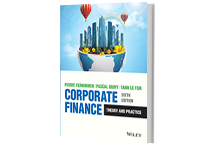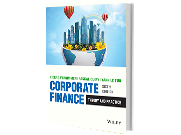Comment, question or quotation of the day
14-02-2026 : Two recent developments on capital markets
Let's start with debt. Last week saw Alphabet, Google's parent company, issue £1 billion at 100 years and 6.125%, which is always an event, given how rare 100-year bonds are for companies. Rare, but not unheard of, since:
• Motorola issued $100 million in 1997,
• JC Penney issued $100 million in 1999 (since gone bankrupt),
• EDF issued £1.35 billion at 6% and $1.18 billion at 6% in 2014,
• Oxford University in 2017 (£1 billion at 2.54%), and
• The Wellcome Trust in 2018 (£750 million at 2.5%).
As an investor, you need to have a strong stomach given the high sensitivity of this type of bond (16.8 for Alphabet bonds). This resulted in a 50% gain in six months between February and August 2016, or between July 2021 and September 2022, with the price of EDF's 100-year bond halving!
But this is just the tip of the iceberg! For several quarters now, the largest borrowers on both sides of the Atlantic, i.e. governments, have been reducing the maturity of the bonds they issue. In the United Kingdom, for example, the maturity of public debt is 8.8 years, its lowest level since 2000. In Germany, France and Italy, the average maturity will fall below 10 years this year for the first time since 2015.
In the USA, this change is desired by the Treasury in order to reduce its budget deficit, since the cost of 2-year loans is 0.5% lower than that of 10-year loans. Of the $1.9 trillion deficit expected in 2026, this ultimately represents a fairly marginal saving of $9.5 billion for taking on liquidity risk, as the amount of debt to be refinanced through new issues automatically increases. Some will see this as a bet that rates will eventually fall, making future refinancing less expensive. Others will see it as a sign of investors' reduced appetite for long-term bonds issued by government whose solvency is deteriorating.
On the equity market, what has been reduced is the length of the order book building phase during IPOs. Fluctuating between 8 and 10 days since 2013, it has been halved to an average of 5 days since the beginning of 2026. And as any average hides a degree of dispersion, the order book for the CSG defence group was closed in three days at the end of January. This obviously considerably limits the risk of a market event derailing the operation, for example because Mr Trump reiterates his desire to annex Canada, or because the Iranian dictator announces the closure of the Strait of Hormuz.
To achieve this objective, extensive pre-marketing work is carried out upstream with major investors, enabling us to gain a fairly clear picture of their interest, the price they might pay and their demand for securities before the official opening of the order book.
07-02-2026 : Dear safe haven
For over 4,000 years, gold has been seen as a safe haven asset. And it's unlikely that this status will be challenged, even by the recent fluctuations in its price: a 25% rise in January, followed by a 15% drop in two days, then a 5% rebound.
Its status as a safe haven asset stems historically from its intrinsic physical qualities, the fascination it holds for humans and, more recently, since the advent of stock markets, its lack of correlation with equity investments. If we go back to the creation of the CAC 40 index on 31 December 1987, the correlation between the daily returns on an ounce of gold and those of the CAC 40 with dividends reinvested is -0.03. This theoretically makes gold an excellent diversification asset, as its fluctuations are completely independent of those of the Paris stock market, and even vary slightly in the opposite direction.
Theoretically, however, as few portfolios contain enough gold for its inclusion to have a significant impact in terms of risk reduction. Indeed, when we read asset allocation advice from fund managers, their target is often around 5% of a portfolio. It is true that for those with a long-term view, and given that gold is cyclical, the contribution to risk reduction is accompanied by a reduction in performance.
Since the end of 1987, the CAC 40 index with dividends reinvested has grown by an average of 9% per year, with a standard deviation of 1.3%. Gold, on the other hand, over the same period of just over 38 years, has yielded 6.5% per annum in euros, with a standard deviation of 1% in its daily returns.
Anyone who invested €1,000 in the CAC 40 at the end of 1987 and reinvested the dividends received now holds €26,530. The same €1,000 invested in gold is now worth €11,000, or 2.4 times less than the CAC 40 with dividends reinvested. While the difference in annual returns between the CAC 40 and gold may seem small at 2.5%, its impact over 38 years is immeasurably greater.
For the American investor who invested in the S&P 500 with dividends reinvested, the annual return has been 11.3% since the end of 1987, with a standard deviation of daily returns of 1.1%, not very different from that of gold (1%). And their share portfolio is now worth $58,800 compared to $10,100 for the gold investment, almost six times more.
The title of this post, "dear safe haven," is not an assessment of the current price of gold, which I am structurally incapable of assessing. It refers to the fact that holding gold has a significant opportunity cost due to its low long-term returns, even though it is currently close to its historic highs, while its volatility is not very different from that of the equity markets.


Glossary
The Vernimmen.com glossary provides definitions for a couple of thousands of financial, stock market or economic terms.
This financial dictionary allows beginners to progress in their learning of finance and to experts to cease the precise meaning of a sentence.

Quiz
The Vernimmen.com Quiz offers over 300 questions with answers to progress in your understanding of finance and to test your knowledge.
Questions are sorted by key topics (financial analysis, investment and stock markets, value, financial engineering and financial management).

Survey
We frequently ask our readers to give us their point of view on a specific topic.
You will find here the current survey with the to-date status of answers as well as past polls.

Financial data
Thanks to our partner Infinancial, we can offer on this page financial data on over 16 000 groups around the world.
Updated several times a year, this database offers information sometimes hard to find elsewhere (beta, …)
The Vernimmen.com Letter
Number 170 of February 2026
News : Financial analysis of listed Spanish groups
Statistics : Dividend recaps
Research : IPOs: beyond preconceived notions, a positive effect on profitability
Q&A : With which power factor should I discount the first cash flow in a DCF?
COMMENTS : Comments posted on Facebook



